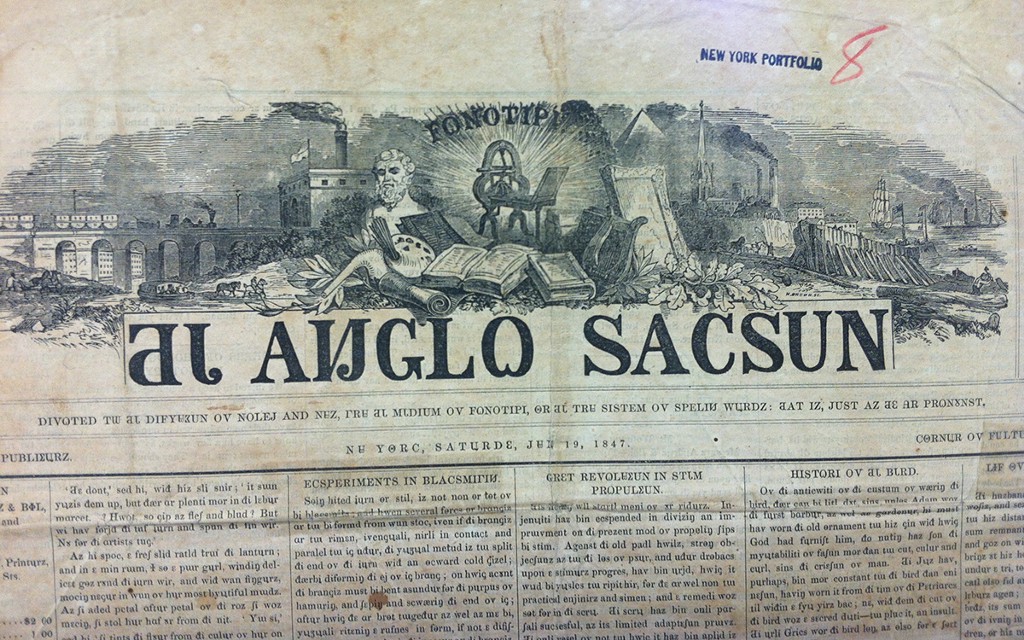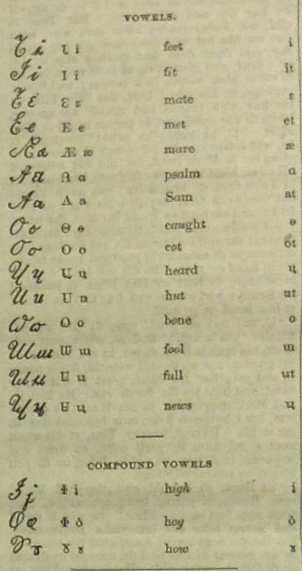Language, Policed: The Monster of Bad Spelling
by Annie Abrams

Shortly after the 2015 Scripps Spelling Bee, John McIntyre wrote in the Baltimore Sun, “English, a bastard language, abounds in bastard spellings. Those damn Normans grafted all manner of French words onto Germanic Anglo-Saxon, and the learned kept meddling with the language to make it more like Latin.” The idea that American English is a corrupted, mutant flowering of the pure Anglo-Saxon root — onto which other languages were grafted — is not uncommon, but it is insidious. And a few months ago, on Last Week Tonight, John Oliver cited some legislation from 1901 that included phrasing like “Anglo-Saxon principles” in contrast to “alien races” to explain why residents in American territories can’t vote. Today, these references to Anglo-Saxons seem antiquated, to be sure, but they’re less references to medieval history than remnants of how upper-class white Americans understood their national heritage in the nineteenth century.
On December 5th, 1846, in the first issue of a newspaper called Di Anglo-Sacsun, an introductory letter to readers heralded the day when “bad spelling, the monster that scares, and grins at, and harasses the people, will fall into fits, like the Giant Despair of Doubting Castle, and will die outright of his spasms.” During a decade when the country was divided over war with Mexico, expansion, slavery, and immigration policy, spelling might seem like a misdirected use of activist energy. But S.P. Andrews and Augustus Boyle, the editors of the Di Anglo-Sacsun, believed that they could end poverty by making literacy less time-consuming and more accessible, particularly for poor immigrants and slaves. As the written language formalized over the course of the first half of the nineteenth century through innovations like the steam press and energetic lexicographers like Noah Webster, standardized spelling had become a newly erected barrier between the upwardly mobile and those who had neither the time nor the resources to crack the code of literacy.

Andrews and Boyle wanted to simplify the process by making spelling entirely phonetic, and even printed the paper using an alphabet called “short-hand phonography” developed by Englishman Isaac Pitman. In “Phonotipy and Phonography,” an essay published in Young American’s Magazine of Self-Improvement — along with pieces like “The Divorce of Learning from Labor” by Horace Greeley and “Great Ideas Free to All Men” by William Channing — Andrews spelled out the merits of phonetic language reform:
The whole business of teaching a child to read, spell, and write…would consist in pointing out the mechanism of the mouth, with its different touches and shapings, and the sounds made by them, together with the letters that represent them. The whole of this, except the period necessary to learn the alphabet itself, would not require a week’s time; whereas it now generally costs eight or ten years of more or less continuing labor in our schools, to learn these arts — and when learned, they are so imperfect that nobody can tell how to pronounce a word correctly by seeing it written.
Di Anglo-Sacsun’s title indicates its aspirational mission: Andrews and Boyle were appealing to a national folk myth about American society’s upper echelons. In an effort to, shall we say, rebrand, many white, upper-class Americans used the label “Anglo-Saxon” self-referentially in the eighteen thirties and forties, regardless of the muddled facts of their real genealogies. Most white Americans, even if they were of English descent, could not be related to Anglo-Saxon ancestors in any traceable way — that population ceased to exist as a distinct group after the Norman Conquest in 1066. Taking liberties with interpretation, self-distinguished “Anglo-Saxon” Americans imagined themselves to be heirs to a medieval culture that prized strength and freedom in the face of oppressors like the Normans. (Thomas Jefferson, whose family was Welsh, wanted Hengst and Horsa, the mythological founders of Anglo-Saxon England, on American currency and hoped all American colleges would teach Old English.)
Andrews and Boyle pointedly explained that they did not choose the title “in a partisan or national spirit, or with a view to render prominent the dysfunction between the different branches of the human brotherhood,” but instead “because it seems to us to contain a proper allusion to the language which it is our primary object to reform.” Although they went on, “We have selected it as the title for our paper, partly for the reason that it has not, so far as we know, been appropriated, and will therefore be distinctive,” another paper by the same name, the Anglo-Saxon, was started in Chihuahua, Mexico, in the same year. The editors of that paper, too, ostensibly believed that their title was politically innocuous; they wrote, “We believe, that the title which we have chosen for our paper, while it is fully significant for our purpose, has nothing in it humiliating or offensive to the people of this State.” It’s strange that these two papers justify their titles in similar ways, given that the former was a liberal reform newspaper and the latter was enacting what John L. O’Sullivan famously termed “manifest destiny.”
Despite the paper’s assumed heritage, the reform advocated by Di Anglo-Sacsun was advertised as a self-fashioning vehicle for poverty-stricken workers of all races — it reprinted poetry by abolitionist John Greenleaf Whittier, and Frederick Douglass advertised the paper in the pages of his own The North Star. A subscriber wrote in anonymously: “Let the books and papers come to be printed in Phonotypes and no mortal power or vigilance can prevent the slave from learning to read. An hour’s instruction from one who knows how to read will put a learner on the track effectually.” Since the paper was concerned with helping people move up in class, image was an important part of its program. The paper’s masthead is rife with symbols — a train, factory, and steamship emblematize progress, while a providential pyramid and church spire legitimate the endeavor. In the center, a gleaming printing press is surrounded by books, a bust of Aristotle, and a harp, while oak and laurel leaves spill over the frame of the illustration and onto the title itself. The mast is cluttered and over-elaborate, and it points to the frenetic energy of the reformers who published the paper.
Although the paper had the support of six thousand subscribers, in October 1848, it went under after a robbery at the paper’s offices. The spelling reform movement kept on plugging, despite the setback; Andrews and Boyle continued to publish essays in support of the cause, though it obviously failed. Reform efforts today, like the English Spelling Society, established in 2014, cites illiteracy as one of the major reasons people should care about making the written language phonetic, with economic and social equality one of its explicit aims.
And what is good spelling worth lately? A few years ago, the New York Times ran an op-ed by Virginia Heffernan that fetishized typos in the digital age because when spell-check fails because “curious readers…get regular glimpses of raw and frank and interesting mistakes that give us access to unedited minds.” That may be true, but even in the age of emoji and spellcheck, the ability to privilege bad spelling — both as a reader and as a writer — leans in part on being a fluent speller in the first place, certified as worthy to receive, judge, and transmit culture and knowledge. Spelling well is still classy today because it’s still a display of class.
